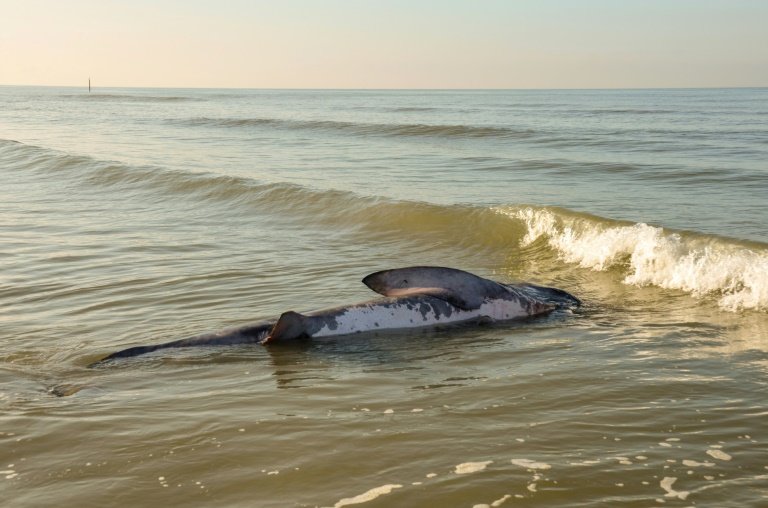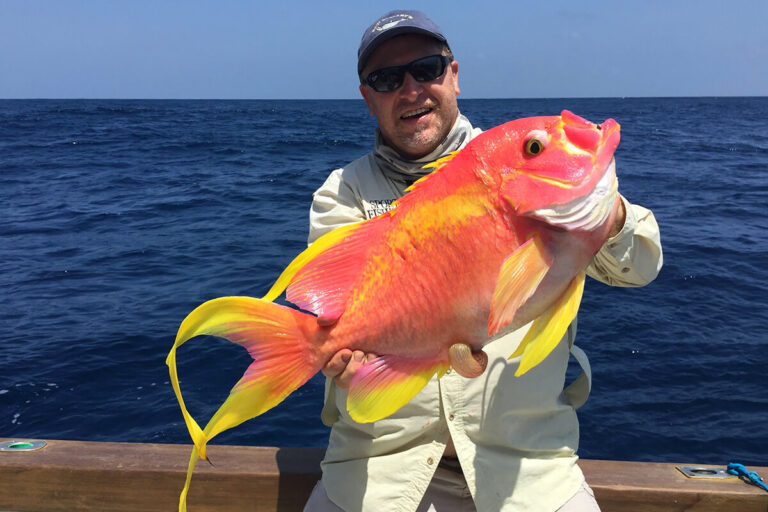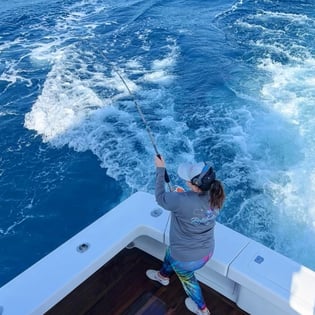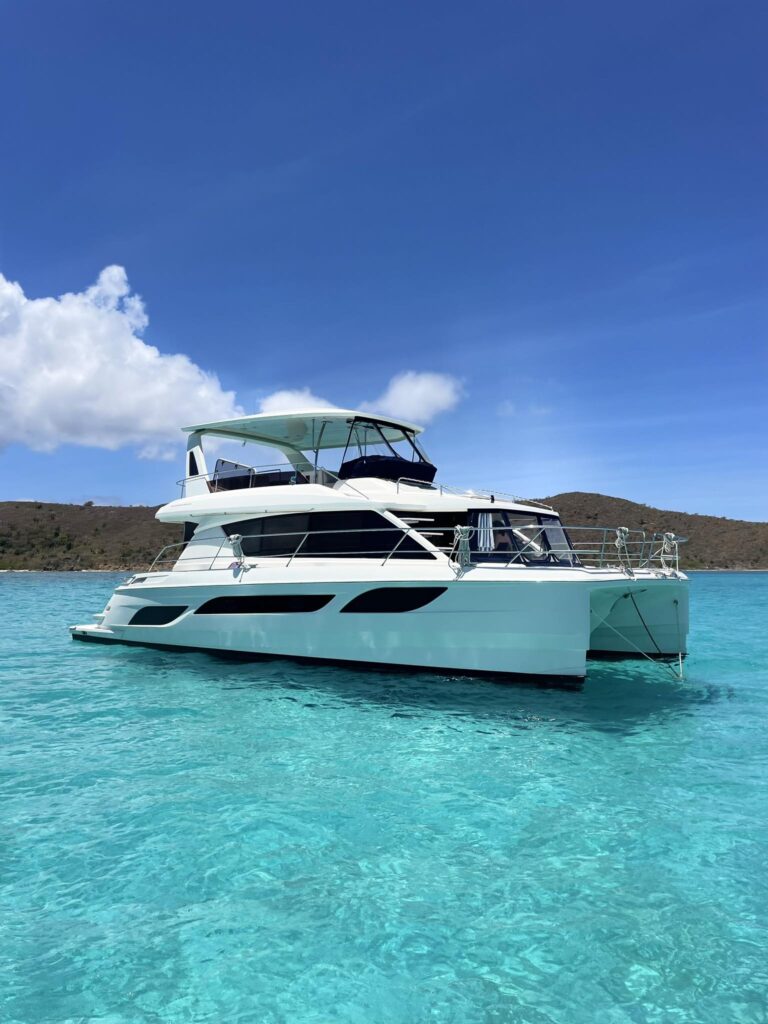Take dramamine at least 30 minutes before deep sea fishing to prevent motion sickness. Deep sea fishing can be an exhilarating experience, but it also involves being on a boat for long periods, which can lead to motion sickness in some individuals.
To avoid feeling nauseous and dizzy during your fishing trip, it is recommended to take dramamine about half an hour before setting sail. Dramamine is an over-the-counter medication typically used to prevent and treat motion sickness. By taking it prior to deep sea fishing, you can enjoy your time on the water without any discomfort.
Remember to follow the instructions on the packaging and consult a healthcare professional if you have any concerns or specific medical conditions.

Credit: www.powerandmotoryacht.com
Understanding Motion Sickness During Deep Sea Fishing
Deep sea fishing is an exhilarating adventure that allows you to experience the thrill of the open ocean and the joy of reeling in a big catch. However, for some individuals, this exciting activity can also bring about an unwelcome companion: motion sickness.
Motion sickness, also known as seasickness, can turn a fun day on the water into a miserable experience. In this section, we will explore what motion sickness is, why it is common during deep sea fishing, and the effects it can have on the body.
What Is Motion Sickness?
Motion sickness is a condition that occurs when there is a disconnect between what your eyes see and what your inner ear, which is responsible for balance, senses. This sensory conflict can lead to feelings of dizziness, nausea, and an overall sense of discomfort.
The severity of motion sickness can vary from person to person, with some individuals being more susceptible than others. Here are key points to remember about motion sickness:
- It is a common condition experienced by many people during activities that involve motion, such as deep sea fishing.
- It is caused by conflicting signals received by the brain from the eyes and the inner ear.
- Symptoms can include dizziness, nausea, vomiting, and sweating.
Why Is Motion Sickness Common During Deep Sea Fishing?
Deep sea fishing involves being on a boat in the open water, where the vessel is subjected to constant motion caused by ocean waves and currents. This continuous rocking and swaying can easily trigger motion sickness in susceptible individuals. Here are some factors that contribute to motion sickness during deep sea fishing:
- Boat motion: The constant movement of the boat can disrupt the body’s sense of balance, leading to motion sickness.
- Visual stimuli: Looking at the horizon or fixed objects on the boat can help alleviate motion sickness by providing a stable visual reference point.
- Sensory conflict: The brain receives conflicting signals from the eyes, which may see the boat rocking, and the inner ear, which senses the boat’s movement.
The Effects Of Motion Sickness On The Body
Motion sickness can have a range of effects on the body, making it important to address and manage this condition during deep sea fishing. Here are some key effects of motion sickness:
- Nausea and vomiting: These are common symptoms of motion sickness and can significantly impact your ability to enjoy the fishing experience.
- Fatigue and weakness: Motion sickness can leave you feeling drained of energy and unable to fully engage in the fishing activity.
- Decreased appetite: The discomfort caused by motion sickness may reduce your desire to eat and drink, leading to potential dehydration and loss of energy.
Understanding motion sickness is crucial for individuals planning to embark on a deep sea fishing adventure. By recognizing the causes and effects of motion sickness, you can take appropriate measures to prevent or manage it, ensuring a more enjoyable and comfortable experience on the open water.
Remember, proper preparation, such as taking motion sickness medication like dramamine, can make a world of difference in your deep sea fishing journey.
Assessing Your Personal Susceptibility To Motion Sickness
Motion sickness is an unpleasant experience that can put a damper on your deep sea fishing adventure. Before you head out on the waters, it’s essential to assess your personal susceptibility to motion sickness. By recognizing the factors that increase the likelihood of experiencing motion sickness and knowing the early signs and symptoms, you can take preemptive measures to prevent it from ruining your fishing trip.
Factors That Increase The Likelihood Of Experiencing Motion Sickness
Motion sickness can affect anyone, but some individuals are more prone to it than others. Several factors can increase your susceptibility to motion sickness, including:
- Inner ear sensitivity: People with a more sensitive inner ear are more likely to experience motion sickness. The inner ear plays a crucial role in balance and detecting motion, so any disruption can lead to symptoms of nausea and dizziness.
- Previous history of motion sickness: If you’ve experienced motion sickness in the past, you’re more likely to suffer from it again in similar situations. The brain creates associations between specific environments or activities and the unpleasant symptoms of motion sickness, making you susceptible to it in the future.
- Visual stimuli: Conflicting visual cues can trigger motion sickness. For example, if you’re inside a tightly enclosed space where you can’t see the horizon, but you can feel the rocking motion of the boat, your brain can become confused, leading to motion sickness symptoms.
- Anxiety and stress: Anxiety and stress can exacerbate the symptoms of motion sickness. When you’re anxious or stressed, your body’s response to motion becomes heightened, making you more susceptible to feeling nauseous or dizzy.
Recognizing Early Signs And Symptoms Of Motion Sickness
It’s crucial to be able to recognize the early signs and symptoms of motion sickness. By identifying these symptoms early on, you can take necessary actions to alleviate or prevent motion sickness from worsening. Look out for the following:
- Nausea: A queasy feeling in your stomach is often the first sign of motion sickness. It may be accompanied by a clammy feeling or sweating.
- Dizziness: Feeling lightheaded or dizzy can be a symptom of motion sickness. You may find it challenging to maintain your balance or feel unsteady on your feet.
- Fatigue: Motion sickness can cause fatigue or drowsiness. You may feel excessively tired and find it difficult to concentrate on your surroundings.
- Increased salivation: Some individuals experience excessive saliva production as an early sign of motion sickness. If you notice a sudden increase in saliva in your mouth, be aware that it may be an indication of motion sickness.
Personal Risk Assessment Before Deep Sea Fishing
Before embarking on a deep sea fishing trip, it’s essential to assess your personal risk of experiencing motion sickness. Consider the factors mentioned earlier, such as inner ear sensitivity, previous history of motion sickness, visual stimuli, and anxiety levels. Reflect on your past experiences with motion sickness and how you’ve reacted in similar situations.
If you’ve had a history of motion sickness or any of the risk factors mentioned apply to you, it’s advisable to take precautionary measures. Speak with your doctor or pharmacist about over-the-counter medications such as dramamine that may help prevent motion sickness.
Additionally, you can try natural remedies like ginger, acupressure wristbands, or focusing on the horizon to minimize symptoms.
Assessing your personal susceptibility to motion sickness is essential before deep sea fishing. By recognizing the factors that increase the likelihood of experiencing motion sickness and being aware of the early signs and symptoms, you can take proactive steps to prevent or manage it effectively, ensuring a more enjoyable fishing adventure.
Expert Tips For Using Dramamine Effectively
Consulting with a healthcare professional before using dramamine:
- Dramamine is an over-the-counter medication commonly used to prevent motion sickness during deep-sea fishing trips. However, it is essential to consult with a healthcare professional before taking any medication, including dramamine. Here are some key points to consider:
- Reach out to your doctor: Before taking dramamine, it is always advisable to consult with your doctor. They can provide personalized advice based on your health, medical history, and potential interactions with other medications you may be taking. Your doctor will assist in determining if dramamine is an appropriate option for you.
- Discuss your medical history: Inform your healthcare professional about any pre-existing medical conditions, including allergies, asthma, glaucoma, or prostate problems. Dramamine may not be suitable or may require caution in certain cases.
- Seek advice for specific situations: If you are pregnant, breastfeeding, or planning to take dramamine for a child, consult with your healthcare professional for guidance.
Determining the appropriate dosage and timing for dramamine:
- Finding the right dosage and timing for dramamine is crucial to ensure its effectiveness without experiencing unwanted side effects. Consider the following:
- Follow the label instructions: Read and carefully follow the dosage information provided on the packaging. Dosage recommendations may vary based on the specific formulation, so it is essential to review the instructions for each product individually.
- Begin with a low dose: If you are unsure about the appropriate dosage, start with a lower amount and gradually increase if necessary. This approach allows you to gauge your body’s response to dramamine while minimizing the likelihood of adverse effects.
- Timing is key: Take dramamine at least 30 minutes before boarding the boat or beginning your trip. This timeframe allows the medication to be absorbed and take effect before you encounter any motion sickness triggers.
Other preventive measures to consider alongside dramamine use:
- While dramamine can significantly reduce the likelihood of motion sickness during deep-sea fishing, combining it with additional preventive measures can enhance your overall experience. Consider the following tips:
- Choose the right seat: When on the boat, opt for a seat that provides more stability, such as one closer to the center or on the lower deck. This can help minimize the sensation of motion and reduce the chances of feeling nauseous.
- Stay hydrated: Dehydration can worsen symptoms of motion sickness. Drink plenty of water before and during your trip to stay hydrated. Avoid excessive alcohol consumption as it can exacerbate feelings of nausea and dizziness.
- Focus on a fixed point: Fixating your gaze on a distant, stable object on the horizon can help your brain reorient itself and reduce the confusion that often leads to motion sickness.
- Control your diet: Prioritize light, non-greasy meals before and during your deep-sea fishing trip. Avoid heavy, oily, and spicy foods that can increase the likelihood of experiencing motion sickness symptoms.
- Mind your breathing: Take slow, deep breaths to help calm your body and mind. Focusing on your breathing can distract you from the sensations of motion sickness.
Remember, while dramamine can be an effective tool in combating motion sickness, it is crucial to consult with a healthcare professional, determine the appropriate dosage and timing, and consider other preventive measures for an enjoyable and nausea-free deep-sea fishing experience.
Conclusion
After considering all the factors, timing is crucial when it comes to taking dramamine before deep sea fishing. It is recommended to take dramamine at least 30 minutes to an hour before your scheduled fishing trip. This allows the medication enough time to start working and prevent motion sickness symptoms from occurring.
However, it is important to follow the instructions provided by your healthcare professional or the medication label for the recommended dosage and timing. Remember that dramamine is not a cure for motion sickness, but it can be a helpful tool in managing the symptoms.
If you are unsure about whether or not to take dramamine, it is always best to consult with your doctor to determine the most appropriate course of action for your individual needs. So, plan ahead, take the necessary precautions, and enjoy your deep sea fishing adventure without the worry of motion sickness interrupting your fun.






